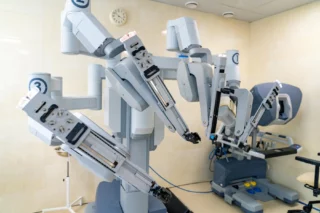
Shady Grove Office
15001 Shady Grove Road
Suite #100
Rockville, MD 20850
Bethesda Office
10215 Fernwood Road
Suite #102
Bethesda, MD 20817

More Cancer Awareness Articles
The Revolution of Robotic Surgery In Colorectal Procedures: Smaller Incisions, Faster Recovery

Colorectal surgery has entered a new era of advancement, thanks to the remarkable innovation of robotic surgery. This cutting-edge technology has not only reduced the risk of complications but also revolutionized the recovery process for patients. In this article, we will explore how robotic surgery is transforming the landscape of colorectal procedures, making them safer and more efficient.
The Robotic Revolution
Robotic surgery has made significant strides since its inception in the late 1990s when the first procedure was performed in the United States. Today, it has become a staple in the field of surgery, with around 400,000 robotic-assisted procedures conducted annually. As multi-armed robotic systems gain popularity, the applications for this technology continue to expand.
Minimal Incisions, Maximum Benefits
One of the key advantages of robotic colorectal surgery is the minimal invasiveness it offers. Patients typically require only three or four small incisions, each averaging just two centimeters in length. This not only reduces the risk of infection but also accelerates the healing process, leaving little to no scarring behind.
Reduced Risk Of Complications
Another remarkable benefit of robotic surgery is the significantly lower rate of blood transfusions during the procedure compared to traditional open surgery. Patients who undergo robotic colorectal surgery experience nearly zero percent transfusion rates, contributing to a safer surgical experience.
Swift Recovery
The speed of recovery after a colorectal procedure can be a critical factor in a patient’s overall well-being. While recovery timelines can vary depending on the specific procedure and individual health, robotic surgery consistently leads to shorter hospital stays compared to open surgery. Patients typically experience less pain and a quicker return to their normal diet and bowel function.
Personalized Care
It’s important to note that each patient’s experience with robotic colorectal surgery is unique. Factors such as the type of procedure and individual health can influence the recovery process. However, the overall trend points toward a smoother, faster, and less painful recuperation period.
Looking Ahead
As technology continues to advance, the field of robotic surgery is expected to evolve even further. These innovations will likely improve patient outcomes and expand the range of conditions that can be treated with robotic assistance.
Robotic surgery has ushered in a new era of colorectal procedures, offering patients minimally invasive options that reduce the risk of complications and expedite recovery. With smaller incisions, lower transfusion rates, and shorter hospital stays, robotic colorectal surgery is transforming healthcare, ensuring a brighter and healthier future for those in need of these life-changing procedures.
Other Articles You May Find of Interest...
- Fighting Cancer for All: Why Diversity in Clinical Trials Matters
- Bill Johnson’s Lung Cancer Crusade: Fighting for a Radon-Free Life
- The Revolution of Robotic Surgery In Colorectal Procedures: Smaller Incisions, Faster Recovery
- Ovarian Cancer Prevention
- Wellness Technology From Nature, Light And Frequency
- Cancer: Improving the Odds
- Acupuncture For Side Effects Of Cancer

















